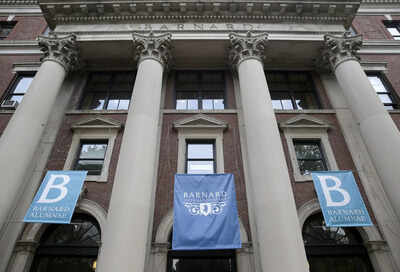ARTICLE AD BOX

On July 1, a bill from the Barnard College bursar’s office landed in the inbox of a rising sophomore: $47,778.50 for fall tuition, due in just over a month. The student’s mother had passed away the previous summer, and she now lives in a single-income household with her father.
Throughout her first year, the family had relied heavily on Barnard’s grants to cover tuition. The invoice arrived with no explanation, no details about financial aid, and no guidance on what the family could expect, a stark reminder that the college’s promises of support sometimes fall short in practice.Barnard College, a private women’s liberal arts college in New York City affiliated with Columbia University, frequently highlights its commitment to diversity, equity, and inclusion. According to the Columbia Spectator, approximately 33% of students received some form of aid during the 2024–25 academic year, and the college boasts that it meets 100% of demonstrated financial need.
Yet, for students from low-income families, the lived experience tells a different story.
Delays that destabilize
After receiving the invoice, the student called the Barnard Financial Aid Office for clarification. A representative explained that the office was behind in finalizing 2025–26 packages and that aid could arrive anytime between the following week and the end of the month. Weeks passed before the student finally received the package on July 21.
In the meantime, the August 4 tuition deadline remained unchanged, and automated reminders from Nelnet continued to press for full payment.Conversations with peers revealed the depth of the issue. Students shared screenshots of emails, snippets of phone calls, and partial information about their aid. Anxiety was contagious. Each day brought families closer to making financial decisions with incomplete information. As Columbia Spectator reported, “Delays in financial aid distribution at Barnard have left students scrambling to meet tuition deadlines while navigating personal hardships.”For low-income students, such delays are not minor inconveniences, they strip students of agency and destabilize planning for the upcoming semester. Without knowing the size of their aid packages, students cannot determine whether to save, pursue work-study positions, or adjust living arrangements. The uncertainty becomes a heavy emotional and financial burden.
Values vs execution
Barnard’s mission emphasizes amplifying marginalized voices and promoting equitable access.
Its affiliation with Columbia University adds an expectation of academic rigor combined with social awareness. Yet the experience of students waiting for delayed aid exposes a disconnect between the school’s stated values and its operational practices.According to the Columbia Spectator, Barnard’s communication regarding financial aid has been “minimal and inconsistent,” leaving students with the impression that low-income families are secondary considerations.
While the college positions itself as an institution that supports all students, those relying on aid often find themselves navigating financial precarity alone.
Lessons for administration
Transparency and empathy are not optional for institutions that claim to uphold diversity and inclusion, they are essential. Sending full tuition bills without explaining delays in financial aid packages conveys that students’ well-being and peace of mind are not priorities.
By failing to proactively update families, Barnard risks undermining trust and equity, particularly for students who do not have financial safety nets.Practical steps, such as consistent email updates, tuition deadline extensions, and clear guidance on aid distribution, could alleviate stress and demonstrate that Barnard truly values the students it admits. As Columbia Spectator notes, the school’s public statements about meeting 100% of demonstrated need must translate into tangible, timely support to be meaningful.
Reimagining student-centered care
The experience of this rising sophomore highlights a larger issue: Low-income students often bear the brunt of administrative inefficiencies. Beyond individual hardship, these delays reflect a systemic challenge in higher education — balancing institutional processes with the human realities of students’ lives. For Barnard to live up to its mission, the college must ensure that its values are reflected in practice.For students and families, the message is clear: Being seen and supported matters. When financial aid is delayed, the school risks sending a different message, one of indifference. Barnard College has the resources and reputation to set a standard for student-centered care. The question remains whether it will act to align its practices with its promise.(Op-ed taken from the Columbia Spectator, reflecting the perspective of a Barnard College student)



.png)
.png)
.png)
















 6 days ago
7
6 days ago
7







 English (US) ·
English (US) ·